Table of Contents
Microsoft’s Surface Pro lineup of tablets has been around for many years now, and received fairly well by customers across the world for primarily its ultra-portable form factor. However, the Surface Pro models of the past years were in a dire need of a redesign, and the Surface Pro 8 is finally that potential game changer that makes the lineup feel modern and premium again.
The latest Surface, while still a tablet format, is no longer advertised as an iPad competitor, but as “the tablet that can replace the laptop” according to Microsoft’s corporate vice president, Panos Panay.
But is it? Well, let’s see how this new Surface fares against the average Windows ultrabook and the Macbook Air of this generation.
The initial smaller Surface computers have been jacks of two trades, trying to combine the touch-friendliness and portability of tablets with the productivity of laptops, while not excelling at either. The tablet experience was dragged down by the lack of proper apps, while the small 10-inch screen was not always enough to get things done.
The Surface Pro series carries on from last year’s Surface Pro, but is different in a few ways: the new device has a bigger screen, thus a more extended working area, has a newer and sturdier keyboard/trackpad folio, is more powerful and includes a larger battery, for extra battery life, and finally offers USB-C Thunderbolt 4 connectivity.
Where ultrabooks still win
In only a couple of words, the Surface Pro is more or less an ultrabook in a different form factor. If it were to replace a laptop though, the Surface should be able to do all the things a regular laptop does, in a similar way a laptop does.
Now, a regular notebook has a clamshell body, with a screen and a keyboard/trackpad/palm-rest halfs, plus the hardware tucked inside the lower part of this ensemble. That gives it a low center of gravity and makes it, well, easy to use in your lap, or as Microsoft says it, “lapable”. More recent 2-in-1 laptops and convertibles have steered somewhat off this classic path, but are still following the same principles, as devices that can be comfortably used in most places and conditions, whether on a desk, on a tight Economy seat of an airplane or while lying down on the couch.
The previous Surfaces failed to do that, and the current Surface Pro still doesn’t master it. The thing is, the Surface Pro is a tablet, with all the hardware tucked behind the screen, and it comes with an adjustable kickstand on the back, which lets you easily place the slate on a flat surface, but not so much on your lap. The kickstand is fully adjustable on this latest Surface and can be locked on any angle that you want, which is a step forward from the older versions, but it still needs tweaking and fiddling to get it in a right position each time, while with laptops, it takes less than a second to lift up the screen and have it properly set-up.
Microsoft also worked on the Keyboard/TrackPad Type Cover of the Surface Pro, which now has a few extra magnets to keep it tighter tied to the slate in most cases. But even so, actually using this device on anything but a flat Surface is going to be lacking.
On top of that, the Surface has two other potential deal breakers: the ports around its side and the typing experience. Given how this is such a thin device, it was expected to have little room around the sides for connectors, but there’s still one USB slot on the Surface Pro, alongside a microSD card-reader and a Mini-DP. However, if you need more, the Surface is not the one for you. Or you can buy the docking unit (see the pictures below).
Last but not least, the Surface comes with a revised keyboard folio, called Type Cover. It packs taller and better-spaced keys than before, plus a larger trackpad as well, and as a result the typing, tapping, and clicking experience is much improved from the Surface Pro and the Pro 2. But the keyboard is still shallow, even by ultrabook standards, so heavy typists like myself might not find it good enough.
These are more or less the main things you might worry about when choosing between a Surface Pro and a regular ultraportable laptop (either ultrabooks or the Apple Macbook Air. Plus the fact that the Surface, with its 12-inch screen, might actually not be big enough for daily use. As someone who relies on a 12.5 inch laptop on a daily basis, that’s not going to bother me at all. You however might feel otherwise, but I’d suggest you should at least give it a try; with the 3:2 screen, the available screen estate on the Surface is actually bigger than what you’re getting on 13 inch 16:9 displays.
Where the Surface Pro 8 winds
All these aside, there are plenty of other reasons why you’d consider a Surface Pro 3 over an ultrabook or a Macbook Air.
Let’s take the form factor for instance. The Surface Pro 3 is slim, compact ( 11.5 x 7.93 x 0.3 inches, 292 x 200 x 7.6 mm) and light (1.76 lbs, 800 g). That puts it in the same ball-park as the 11.6 inch Apple Macbook Air, but this latter device is actually thicker and heavier (2.38 lbs, 1.1 kg). And when compared to regular 13 inch ultrabooks, the Surface is in a class of its own even when compared to the lightest models.
This post from The Verge also looks at the Surface and the Macbook Air, as well as the video below, so you might want to check them out.
Unlike the 11.6 inch MBA, the Surface Pro packs a larger 12 inch high-resolution touchscreen, with a 3:2 aspect ratio. And that’s more important than you might think on a first look, as it makes the tablet feel more “roomy” to use both in Portrait and in Landscape mode.
The Surface Pro integrates a digitizer (N-Trig though, not a Wacom one as on the Surface Pro 2) and comes with a preincluded pen, a combo that makes it suitable for taking notes, sketches, drawings and so on, but you will find the same bundle on some ultrabooks as well though, like the Sony Vaio Duo 13.
Hardware wise, the Surface Pro can be specced up to Intel Haswell Core i7 processors, 8 GB of RAM and 512 GB SSDs. Software wise, it runs a fully baked version of Windows 8.1 and thus all the standard software you’re already using on other Windows machines, and that puts it on par with any modern ultrabook.
The Surface Pro is also rated at up to 9 hours of battery life, which is comparable to what you’re getting with most ultraportable laptops these days. But we’ll see how that actually translates in real-life performances, I reckon we’ll be getting less from the beefier configurations, given how there’s a rather small battery inside this slim tablet.
Last but not least, there’s the price. The Surface Pro starts at $799 for a Core i3 / 4 GB of RAM / 64 GB SSD configuration, while the top options will go close to 2G, and you’ll add $129 for the Type Cover.
A Core i5 / 4 GB / 128 GB SSD with the Type Cover will set you back a little over $1100, and that’s a competitive price. Most premium 13 inch ultrabooks start somewhat higher than this, with a few exceptions, like the convertible Lenovo Yoga 2 Pro or the classic HP Spectre 13T-3000, to name just some of them. So price-wise, the Surface Pro looks great. There are of course much cheaper ultrabooks you can buy these days, but those don’t exactly play in the same league as this Surface.
Wrap-up
At the end of the day though, the Surface Pro is more or less a bump from the previous Pro models. The increased screen size is definitely an important change and alongside its other tweaks, like the revamped Type Cover and kickstand, longer battery life and fair price, the Surface Pro 3 is in my opinion a more interesting device than the previous Surfaces were.
It’s not necessarily meant for tablet use, although you can use it like that if you want to and it’s going to offer a more pleasant experience than the 13 inch 2-in-1 laptops do, since it is smaller and lighter. But the tablet experience is still hindered by the lack of proper apps, so if you look at it as a slate, the Surface Pro will not sound that great.
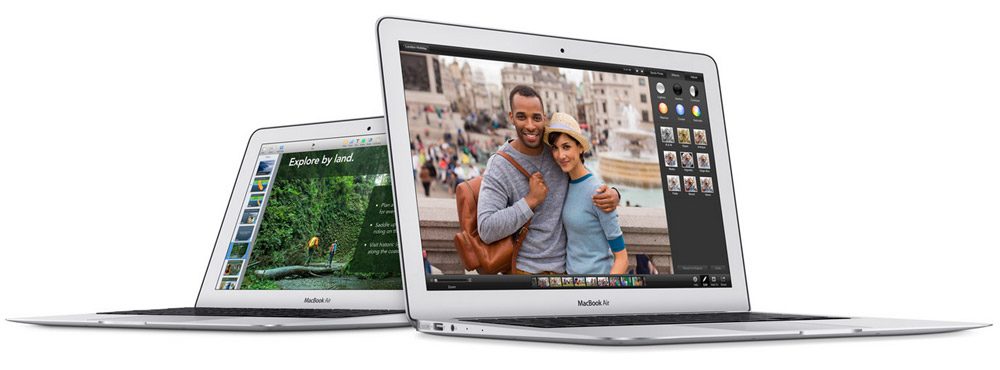
The Surface Pro could be an ultrabooks alternative for some of you, but regular laptops still have their fair share of aces
As a laptop replacement though, it might. It really depends on what you want from your device though. The Surface will handle movies, browsing and other everyday activities just as well as a regular laptop. You’ll just hold and use it differently. However, if you need the keyboard, the ports or the precision provided by a proper TouchPad, the Surface might not be what you want. But again, that’s highly subjective, so if this Surface Pro caught your attention, you might want to give it a try and see how it works for you.
Long story short, the Surface Pro can be, for some of you looking for a compact, powerful and long-lasting Windows based device, the tablet that could replace the laptop, ultrabook, or the Macbook Air. But at the same time, it might not, simply because you want a proper keyboard, a wide trackpad, ports or even the “lapability” and ease of use provided by a classic ultraportable. So as expected, each side has its own particularities, and to sum them all up in a single sentence: with the Surface Pro, you get the form factor and the sleek and light body at the expense of a few standard ultrabook features.

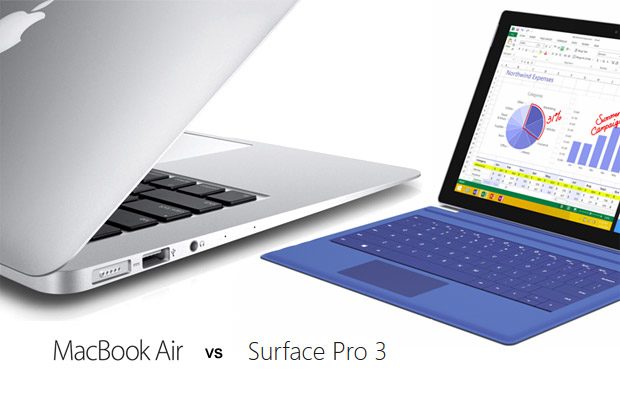
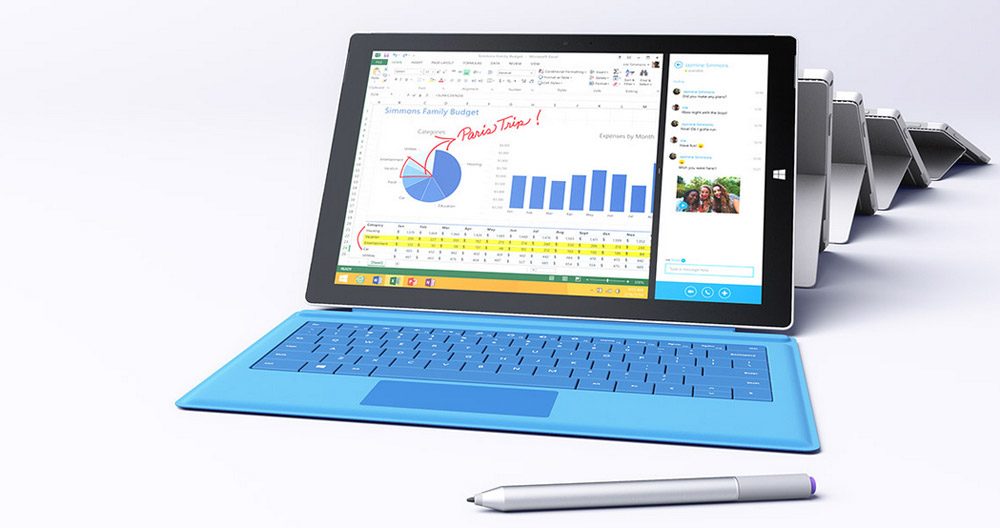
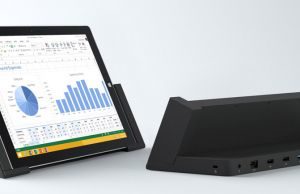
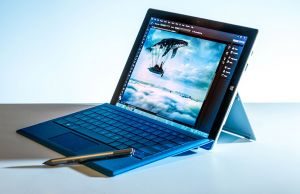
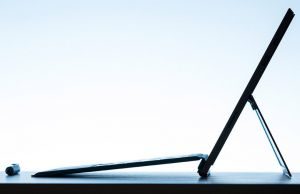

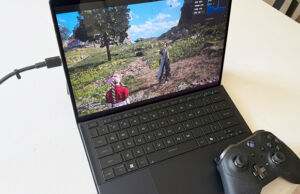
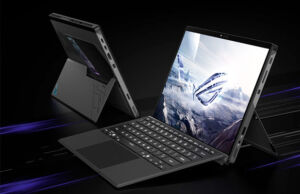
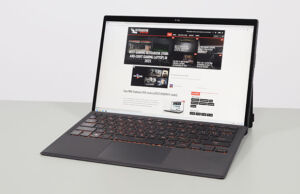
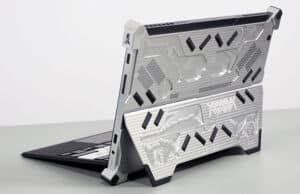

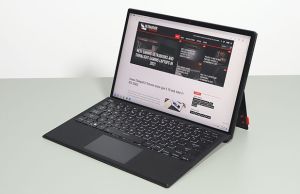
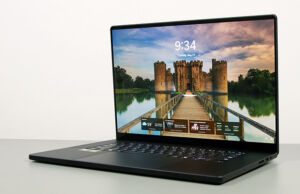
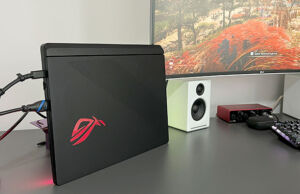
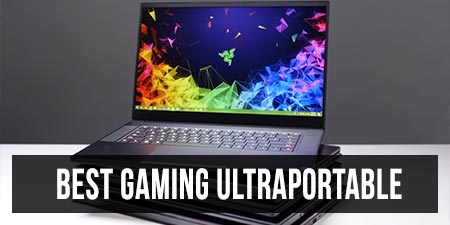
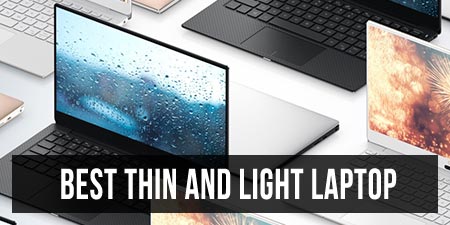
Avi
August 28, 2014 at 7:23 pm
I work almost all day on a computer, but also have plenty of meetings.
This is what I was thinking: Buy a Bluetooth keyboard and a monitor (Microsoft has written that they can be connected). I have a Bluetooth mouse already as well as a 1 to 4 USB port.
This way I have the “standard” desktop computer when I’m in front of the computer, but at the same time, I have the portability of a tablet for meetings.
What do you think? Crazy, brilliant, or meh?
Andrei Girbea
August 28, 2014 at 9:04 pm
Should work. Or you could use an external docking station and connect all the peripherals to it and then have only one cable to hook to the tablet each time. This way you don’t have to get Bluetooth mouse/keyboard and you can get anything you’d want.
Rachelle
October 30, 2014 at 12:39 pm
Hi,
I am looking to buy a laptop and having a lot of difficulties. I found your website and thought maybe you could help me choose one that suits me. I wanted to buy the macbook air because it is small and thin, but my brother said that it is not the best. I want a laptop that is small, thin and light. I will be using it for Microsoft office only. Please help me! Thanks
Andrei Girbea
October 31, 2014 at 11:58 am
The Air is a very good computer, except for one thing: the screen. The build quality, keyboard, performance and especially battery life are all top notch. If you want a windows computer though, there are plenty of options in this post: https://www.ultrabookreview.com/251-best-ultrabooks/ . Try to narrow them down and then I can help pick one if you want to.
Avi
October 31, 2014 at 4:58 pm
If all you’re using the laptop for is Microsoft Office, you should not be spending more than $1,000 under any circumstances in my opinion. Of course, if you’re taking it around with you frequently and need it to be light, then there’s more to talk about.
A notebook would probably do the job for you if you just need it to be light and capable of handling Microsoft Office.
Vik
September 29, 2014 at 6:35 am
Crazy. You could get a laptop and do all of the above easier and better.
Diana
November 26, 2014 at 5:10 pm
Hi,
need help. Looking for laptop, size between 11 and 12 inches with stronger hardware that will support software for video and photo editing. Price range $1500.
Thank you
Andrei Girbea
November 26, 2014 at 6:10 pm
There aren’t many powerful 11 inchers. The 11 inch MBA is perhaps the fastest you could get.
There are a few nice 12.5 inchers though, like the Lenovo THinkpad Yoga or the THinkPad X240. HP and Dell have some business units in this size-range as well.
Diana
November 26, 2014 at 9:55 pm
Thanks on fast respond.
What is your advice than between Dell XPS 13, Apple Mac Air or Acer Aspire S7-392-9439? Those are 13 inch.
Andrei Girbea
November 26, 2014 at 10:01 pm
Mac Air – really really good, except for the screen. Long battery life, good price (base model)
Aspire S7 – nice, light. hate the keyboard and the glass covered body. A bit pricey, but might be available discounted here and there
XPS 13 – compact and well built, good keyboard. Lacks an SD card-reader. Can get a bit warm under load
Dregen
December 31, 2014 at 6:41 pm
Hi Andrei, love your reviews.
I really sold on Surface Pro 3, with its portability, light weight, slim, simple design & good performance. I almost buy it today yet I decide to google some more.
Money not an issues, ask long as it 2 in 1 But of coz cheaper would been better. I can live with lesser spec but in my line of work, this is the only thing that SP3 lack :
Sim card slot – this is a must for me, for on the go internet connection
GPS also would been great.
Rocío
August 6, 2015 at 12:03 pm
Hi, I´d like to know if the Air is really worth it in the terms I need it. Don´t need it to be too powerful, but enough to support multitasking and some video editing with an acceptable speed. Don´t want touchscreen either. I need it to be light and as silent as possible. I´ve been checking the Asus UX305FA but I´m not sure if its going to be powerful enough or if I will have real problems with wifi connection. Is the difference that big in those aspects? Thank you.
sanjay disodia
November 17, 2015 at 8:03 am
i want to buy surface pro 3 but i love to play games with high grapichs Project IGI,GTA vice city,Delta force and Battlefield. so may u tell me that surface pro 3 is capable to habdle all this or not??
Marco
January 28, 2016 at 3:21 pm
Hello,
Great reviews and comments.
At this moment with all the experience that you had with both models, which one would you recommend?
Surface pro 3 vs HP Spectre 360
I just ordered the SP3 ( I can return it)
But I read your review on the HP Spectre.
Thank you,
Marco
Andrei Girbea
January 28, 2016 at 6:47 pm
Well, the Surface Pro 3 is outdated now, Microsoft Released the Surface Pro 4 with Skylake hardware, but a pretty hefty price. Still, I’d get the Surface if you plant to use the device mostly in tablet use and profit from the pen and inking capabilities. As a laptop, it’s going to be alright as long as you keep it on a desk, but rather uncomfortable to use anywhere else. It’s not the best pick for typing also, but you can get the Surface Pro 3 with the new TypeCover released last year, which is a major improvement.
The Spectre is larger and heavier, but it’s actually a real laptop. The latest versions come with Skylake hardware, but there are some older configurations as well.
Marco
February 5, 2016 at 4:22 pm
Andrei,
Thanks for your reply.
I got the newest HP Spectre X360 i7 sixt generation. Skylake 13-4103dx.
The machine is beautiful and has a lot of ports. Performance besides the battery is good.
But for me the battery life is critical. It is giving me only 4 hours with light use.
I am thinking on returning it and get instead a Surface pro 4 i5 8 GB Ram 256 SSD.
Would be this a good move or would you recommend a different sytem/brand?
Andrei Girbea
February 7, 2016 at 3:59 pm
Well, the X360 is one of the longer lasting devices in that class, if you only get 4 hours out of it, you probably push it a lot. In this case, you should look for a device with a much larger battery, but there aren’t many options. Perhaps something like the Lenovo X260, T460, but those are not 2-in-1s. HP and Dell also have business lines, but these are usually expensive.
Imam Siddique
April 14, 2016 at 2:28 pm
Microsoft surface has been better than AL other laptop and tablet
Shloime
September 13, 2016 at 3:44 pm
Hi, I’m looking for a laptop that starts up almost immediately, like my iPad. The only real need i have for this new laptop i’m thinking of purchasing is to keep a daily journal. the important features for me what i’m looking for is a great backlit keyboard and immediate start up. i’d also want one that’s very portable and light. I don’t have any need for games, movies, etc for this laptop. I tried a few bluetooth keyboards for my iPad, they didn’t connect well, if at all. I was told this is a problem with iPads, which is why i’m looking for an economical alternative to get- a small, speedy-responding laptop. thank you for your time and expertise!
Andrei Girbea
September 14, 2016 at 10:36 am
well, you’re not going to get that on Windows laptops, even the best have a delay of around 1-2 seconds when resuming from sleep. You could have a look at the Apple Macbook, if within your budget, should come close to what you want, albeit its keyboard isn’t that solid, due to the very shallow travel.
Dan
February 12, 2017 at 6:51 pm
Hi
I've recently bought the Surface Pro 4 with i7 6650U, 16GB RAM, 256GB SSD at around 1800EUR.
It's quite expensive at what it seems to offer(battery life is only 4-5 hours with browsing only) and I have a feeling I can get a similar performance at a much lower price without the pen functionality(don't really need it).
Do you know any ultrabooks between 1000-1200 EUR with faster processor(looking for quad core), that are portable(13-14" max) and ideally have a longer battery life?
Thank you
Dan
Andrei Girbea
February 14, 2017 at 4:56 pm
You're not going to find a quad-core processor in a modern laptop in that price range. You can look at some older units like the Gigabite P34W and MSI GS40, but those are not widely available.
Also, keep in mind that a quad-core processor is a more energy hungry laptop, so you won't get very good battery life with laptops built on such platforms. Your expectations need to be more realistic :P
Dan
February 12, 2017 at 7:01 pm
Hi
I've recently bought the Surface Pro 4 with i7 6650U, 16GB RAM, 256GB SSD at around 1800EUR. Looking to use it for web development(AngularJS, etc).
It's quite expensive at what it seems to offer(battery life is only 4-5 hours with browsing only and it's only dual core) and I have a feeling I can get a similar performance at a much lower price without the pen functionality(don't really need it) and maybe that Microsoft overpriced this laptop.
On the other hand, the Surface Pro 4 seems quite quick and has a nice GFX card.
Do you know any ultrabooks between 1000-1200 EUR with faster processor(looking for quad core), that are portable(13-14" max) and ideally have a longer battery life?
Can I get a much better deal at this price range? Or should I better keep the Surface Pro 4?
Thank you
Dan
PS: please discard previous comment
Dan
February 14, 2017 at 7:12 pm
Looking at Lenovo 710S and it seems like a very good option in the 1000Eur price range, although I can only find it with 8GB RAM.
I'd really like 16GB on a 13-14" laptop and with a good i7 processor.
Is there anything that beats the Lenovo 710s in this price range? It is said it's a good competitor for Dell XPS 13. Not sure about that, what do you think?
Thanks a lot!